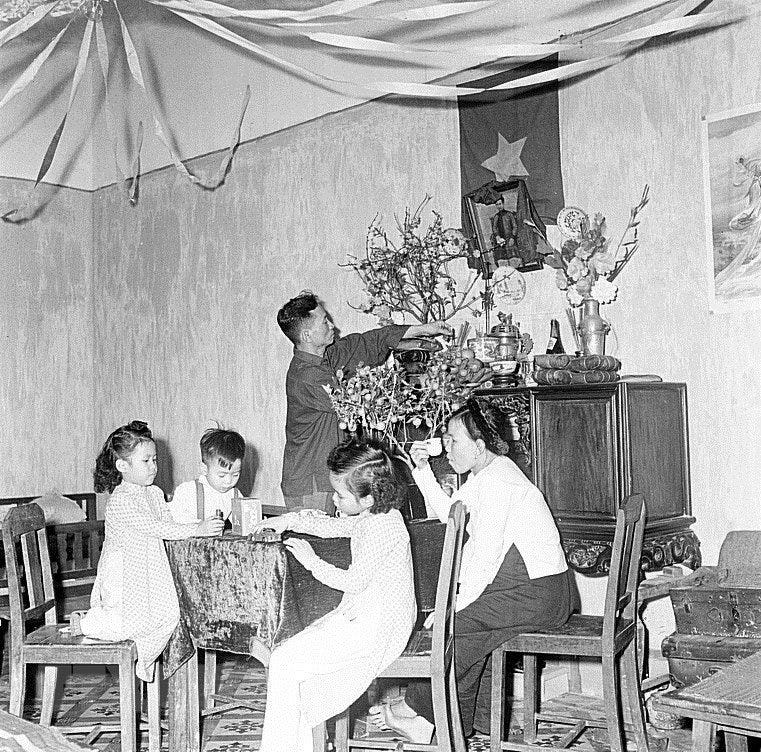This is my translation of "Cách Xưng Hô Bằng Tiếng Việt Áp Dụng Trong Gia Đình" from "Kiến Thư" by Phạm Kim Thư, published in Canada, 2001. The content has been modified to remain free of political references.
In this second part, you will discover how to address your parents, parents-in-law and siblings of your parents & grandparents in Vietnamese.
If you haven’t read Part 1, please check it below:
Part 1: Assign names to family members according to their hierarchy
II. Pronouns in a family
A family spans ten generations, each with distinct pronouns: tổ tiên, kỵ, cụ, ông bà, cha mẹ, con, cháu, chắt, chút, and chít. Our children refer to us as 'cha mẹ'. Our grandchildren call us 'ông bà,' while our daughter's children specifically address us as 'ông bà ngoại' or simply 'ngoại' (meaning outside), with 'ông ngoại' for maternal grandfather and 'bà ngoại' for maternal grandmother. In contrast, our son's children use 'ông bà nội' or 'nội' (meaning inside), with 'ông nội' for paternal grandfather and 'bà nội' for paternal grandmother. Our great-grandchildren, or 'chắt', refer to us as 'cụ', while our great-great-grandchildren, or 'chút', call us 'kỵ'. Finally, our great-great-great-grandchildren, or 'chít', honor us as 'tổ tiên'.
When two children marry, joining two families together as in-laws, the terms used are ‘thông gia’, ‘thân gia’, or ‘sui gia’. Among the in-laws or between them and their friends, the pronouns used are: ông bà thông gia, ông bà thân gia, ông thân, bà thân, ông bà sui gia, ông sui, and bà sui.
1. Address your parents
‘Cha mẹ’ is used when you talk about your parents with friends but when talking directly to your parents, you can use: bố mẹ, cha mẹ, ba má, ba me, cậu mợ, thầy me, thầy bu, thân sinh, song thân, các cụ chúng tôi, ông bà nội các cháu, ông bà ngoại các cháu, etc.
When discussing your parents with friends, use ‘cha mẹ’. However, when speaking directly to your parents, you can use terms such as: bố mẹ, cha mẹ, ba má, ba me, cậu mợ, thầy me, thầy bu, thân sinh, song thân, các cụ chúng tôi, ông bà nội các cháu, or ông bà ngoại các cháu.
You can refer to your mother using various terms such as: má, mẹ, me, mệ, mợ, bu, u, vú, bầm, đẻ, etc., and your father as: bố, ba, thầy, cha, cậu, tía, etc. There are indeed more pronouns for mothers than for fathers, suggesting that mothers often have a closer bond with their children. Consequently, the relationship between a child and their mother tends to be more intimate and is reflected in the greater variety of pronouns used.
For men, your parents-in-law are referred to as: ông bà nhạc, ông nhạc, bà nhạc, cha mẹ vợ, cha vợ, mẹ vợ, etc. When talking to friends, you might mention your wife’s father as: nhạc phụ, nhạc gia, bố vợ, ông nhạc, cha vợ, ông ngoại các cháu, trượng nhân, etc., and your wife’s mother as: mẹ vợ, má vợ, bà nhạc, bà ngoại các cháu, nhạc mẫu, etc.
For women, your parents-in-law are referred to as: cha mẹ chồng, cha chồng, mẹ chồng, các cụ thân sinh của nhà tôi, ông bà nội của các cháu, and so on.
When speaking with your parents-in-law, you should adhere to the pronoun system used for your own parents, depending on the family's customs. A stepfather can be referred to as cha ghẻ, kế phụ, cha, cậu, or dượng, while a stepmother can be called mẹ ghẻ, mẹ kế, or kế mẫu.
2. Address siblings of your parents and your grandparents
In Vietnamese culture, your father's older brother is referred to as ‘bác’, while his younger brother is called ‘chú’. Your father's older sister is also ‘bác gái’, and his younger sister is known as ‘cô’ or ‘o’. There is a traditional folk song that rhymes these terms.
‘Một trăm ông chú không lo, chỉ lo một nỗi mụ o nỏ mồm’
(A hundred uncles pose no issue/ but a single aunt with a big mouth can be concerning)
Your mother's older brother is called 'bác', while her younger brother is referred to as 'cậu'. Her older sister can be addressed as 'già' or 'bác gái', and her younger sister is known as 'dì'. In some families, children are encouraged to call 'cậu' and 'dì' by the terms 'chú' and 'dì’ to create a sense of equal closeness between the maternal ('ngoại') and paternal ('nội') sides, effectively treating both sides as 'nội'.
The wife of 'bác' (father's or mother's older brother) is called 'bác gái'. The wife of 'chú' is called 'thím', and the husband of 'cô' or 'dì' is referred to as 'chú', 'chú dượng', or 'dượng'. The husband of 'bác gái'/'già' is called 'bác'/'bác dượng', and the wife of 'cậu' is known as 'mợ'.
Your grandparents' older brother is referred to as 'ông bác' ('bác' of your parents), while his older sister or wife is called 'bà bác'. Your grandfather's younger brother is 'ông chú' ('chú' of your parents), and his younger sister is 'bà cô' ('cô' of your parents). Your grandmother's younger brother is known as 'ông cậu' ('cậu' of your parents), and her younger sister is 'bà dì' ('dì' of your parents). The husband of 'bà cô' or 'bà dì' is called 'ông dượng' ('dượng' of your parents). In everyday conversation, these terms are often simplified to chú, bác, ông, or 'bà' to replace the more specific titles like 'chú dượng, bác gái, ông bác, ông chú, ông cậu, ông dượng, bà bác, bà cô', or 'bà dì'.
The third part will come next Tuesday 13th May.
If you enjoyed the article, feel free to share it with others.
Other ways to connect with Learn Real Vietnamese:
Website: https://zaap.bio/realviet
Instagram: https://instagram.com/learn_real_vietnames
TikTok: https://tiktok.com/@realviet
Facebook: https://facebook.com/learn.real.viet
Message me if you have any suggestions/ ideas/ questions/ feedback/ etc.


